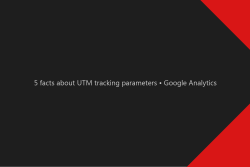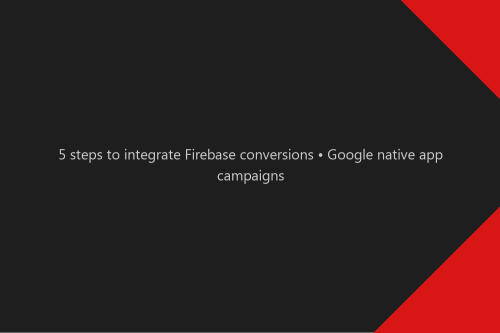IDFA is dead, but can Google also kill GAID?
Apple, with the release of the iOS 14, will kill IDFA. What will happen if Google will also removes GAID from Android? Apple kills IDFA and GAID with one move. As we know, Apple...
Filter by Category
Filter by Author

Apple, with the release of the iOS 14, will kill IDFA. What will happen if Google will also removes GAID from Android? Apple kills IDFA and GAID with one move. As we know, Apple...
Posted by Wojtek Andrzejczak

How will the programmatic mobile advertising change after the iOS 14 release? How we’ll be able to run programmatic campaigns? YT#2 – iOS 14 vs. programmatic advertising How...
Posted by Wojtek Andrzejczak

Learn more about the new tracking permission screen that Apple has introduced in the iOS 14. YT#1 – iOS 14 tracking permission screen Why has Apple decided to turn off IDFA?...
Posted by Wojtek Andrzejczak

Learn how to configure a Firebase project with Google Analytics to track app and web traffic in a few simple steps. What problem do we want to solve? Let our client collect...
Posted by Wojtek Andrzejczak

Learn how to implement tracking campaign tracking to let you track your campaigns in Google Analytics. Why should you use campaign tracking parameters? Tracking parameters...
Posted by Wojtek Andrzejczak

Google Analytics UTM tracking parameters, what they are, and how to use them in digital advertising. What Google Analytics UTM’s is? UTM allows us to tag URLs with...
Posted by Wojtek Andrzejczak

Remarketing Attribute is a part of the Dynamic Content in Google Studio. What it is and how does it work, I’ll explain in this article. What is Remarketing Attribute? In...
Posted by Wojtek Andrzejczak

Learn how to optimize slow dashboards and reduce loading time while interacting with sorting and filtering your data.
Posted by Wojtek Andrzejczak

Guide on how to create a Dynamic Profile in Google Studio. It is first to step to build Dynamic Creatives.
Posted by Wojtek Andrzejczak

Learn how to improve HTML5 creatives loading performance and avoid common mistakes.
Posted by Wojtek Andrzejczak

Apple, with the release of the iOS 14, will kill IDFA. What will happen if Google will also removes GAID from Android?
Contents
As we know, Apple has introduced new changes in the upcoming iOS 14, in which IDFA is disabled by default. It is possible to ask the user to opt-in with the tracking permission screen, but it is almost sure that very few users will allow being tracked by third-party companies across the world.
Even if they allow to adjust a message on the permission screen, Apple has already pushed forward the whole privacy movement.
We have to remember that Android has 74% of the market share worldwide on mobile devices, and Google is using GAID for its advertising platforms. Apple’s move with IDFA has already started an open discussion if Google should also introduce a similar privacy solution. Within 1-2 years, Google may need to dedicate GAID as well.
In recent months, we have observed many changes in the advertising industry. New Your Times cuts 3rd party data suppliers, California Consumer Privacy Act (CCPA) has introduced “Do Not Sell My Personal Information” consent. Combined with Apple privacy changes in iOS 14, it should be clear that privacy and transparency in advertising will be the most crucial topic for the next upcoming months.
If we look at all those changes and discussions, one thing is exact, and mobile advertising will change entirely, everything we knew will change, and it looks like it might be like a hard reset.
The future of IDFA is clear. It is gone. GAID? I’d say that will be gone soon, just the question when exactly.
On the one hand, Google could switch to use an App Instance ID on iOS/Android on behalf of the Mobile SDK or AdMob. The problem is that each app on the user phone would have a different App Instance ID, and after reinstalling, this ID would be changed to new. But it does not solve the Cross-Device tracking problem.
However, Google also has a Firebase SDK, one of the most popular mobile SDK on the market. It is used together with Analytics App+Web to track users across the app and web environment.
Firebase allows us to use one SDK and link many services like Google Analytics, Google Ads, Google DV360, Google Ad Manager, AdMob, and many more. The list of functionalities is very long, and [here] you can read more.
I’d not be surprised if Google would come up with an idea of integrating other advertising related SDK’s like AdSense, Mobile Ads SDK, under Firebase, to keep the integrity of the data within one platform. With this move, they could solve cross-device tracking and analytics problems as well.
Subscribe to our newsletter!

How to estimate the invalid visits in the campaign reporting? Why this problem exists and how we could avoid report discrepences.

Integrate Firebase conversions in Google Campaign Manager, Google Display & Video 360 and Google Ads to optimize your native app campaigns.